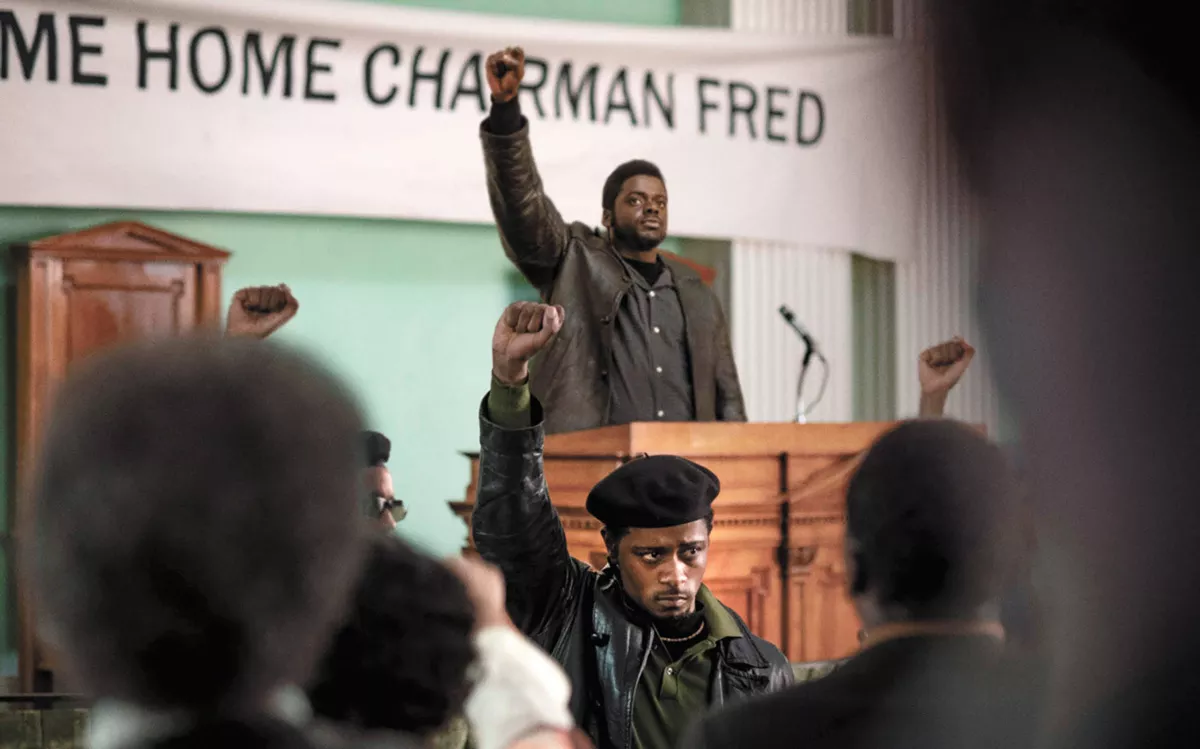History so rarely gets translated into compelling but believable narrative films that it's tempting to label Shaka King's Judas and the Black Messiah as a surprise. This is an assured, confident film about a particularly chaotic episode in recent American history, and the characters, all of them fictional interpretations of people who really existed, reflect that chaos.
Compare this movie to Aaron Sorkin's recent The Trial of the Chicago 7, which was set in the same time period and deals with similar political material, and yet whose characters felt like conduits for regurgitating the writer-director's Big Ideas about the era. Here, the characters actually resemble human beings. They're not always virtuous. They're mired in contradiction. In Sorkin's film, the characters tended to behave as if their places in history have already been secured. In King's film, the characters seem to realize that their legacies are still in the process of being written.
The movie begins in 1968 Chicago, where Fred Hampton (Daniel Kaluuya) is an enterprising 20-year-old activist who has risen within the ranks of the still-nascent Black Panther Party and is chairman of the organization's Illinois chapter. Hampton's concerns are primarily philanthropic — he's most proud of a free breakfast program he's established in his neighborhood — but the FBI sees the Panthers as a terrorist organization and Hampton as a dangerous insurgent, and their goal is to sow as much discord as possible between its various chapters.
Enter William O'Neal (Lakeith Stanfield), a petty crook who's arrested for a scheme in which he poses as a fed, raids a bar and runs off with someone's car. (His justification: "A badge is scarier than a gun.") An FBI agent (Jesse Plemons) strikes a bargain with him: O'Neal can sidestep federal charges if he'll infiltrate the Black Panthers as part of the bureau's COINTELPRO campaign, buddying up to Hampton and bringing back as much insider information as possible.
O'Neal realizes he's in a lose-lose situation: Either he sells out his own people, or he becomes just another statistic in the prison system. Ironically, he lands a position within the Chicago Panthers' security detail, and though he isn't Hampton's closest ally within the organization, he's enough of a confidante that his capacity as informant becomes more and more lucrative.
Hampton preaches the need for racial revolution by any means necessary, and part of that mission involves uniting Black militant groups with seemingly contradictory philosophies (this outreach led to Hampton's racial unity movement, the Rainbow Coalition). He has also accepted the reality, both publicly and in private, that he may have to die for his peaceable cause, and he has no illusions about the likelihood that he could die at the hands of the police. Hampton's pregnant girlfriend Deborah Johnson (Dominique Fishback), meanwhile, is struggling with Hampton's idea of sacrifice: How can he be so resigned to his fate when there's so much work left to be done, and when he has a baby on the way?
Of course, we know Hampton's fate (and the fate of most of his colleagues) going into Judas and the Black Messiah, but the film nonetheless has the seductive pull of a thriller. King and his co-writer Will Berson have filled this sensitive story with moments of genuine suspense and unexpected violence, including a moment in which O'Neal, under suspicion after the Panthers become aware of a mole, is pressured into hotwiring a car at gunpoint.
In only a handful of films, Daniel Kaluuya has already developed into one of the most exciting actors around, and this might be his best role yet. As Hampton, he gets the predictable show-stopping moments, where he's delivering stirring speeches in front of rapt crowds, but he also gets some nice intimate ones: One of the most humanizing scenes has Hampton alone in his office after hours, reciting along to recordings of old Malcolm X speeches like they're Shakespearean soliloquies. Stanfield's role is arguably the trickier one, however: He has to keep us invested in O'Neal's inner turmoil, without simply playing the character as a rat with only his interests at heart.
O'Neal is the Judas of the title, though his betrayal of Hampton isn't driven by ideological concerns so much as pure self-preservation. It would be easy to pin Hampton's 1969 death during a police raid solely on O'Neal's duplicity, but King's film realizes things are much more complex than that: Because Hampton's murder was no doubt an inevitability in the minds of J. Edgar Hoover's FBI, O'Neal was merely a tool in expediting a cruel process.
That's what makes Judas and the Black Messiah such a brilliant drama: It isn't storybook history with the edges sanded down. Like Ava DuVernay's Selma, another recent biopic about the 1960s civil rights movement, it's enlightening both factually and emotionally, reminding us that noble social causes still have complicated personalities at their centers. ♦
![]() Judas and the Black Messiah
Judas and the Black Messiah
Rated R
Directed by Shaka King
Starring Daniel Kaluuya, Lakeith Stanfield, Jesse Plemons, Dominique Fishback
Streaming on HBO Max Feb. 12

